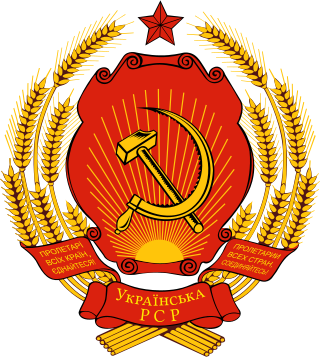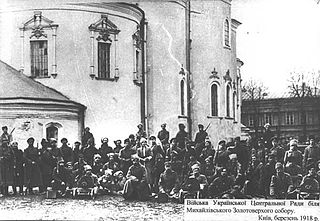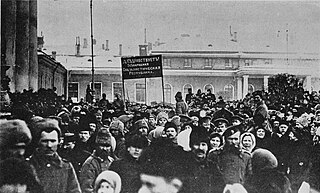
The Bolsheviks, led by Vladimir Lenin, were a far-left faction of the Marxist Russian Social Democratic Labour Party (RSDLP) which split with the Mensheviks at the Second Party Congress in 1903. The Bolshevik party seized power in Russia in the October Revolution of 1917, and was later renamed the Communist Party of the Soviet Union. Their ideology and practices, based on Leninist and later Marxist–Leninist principles, are known as Bolshevism.

The October Revolution, known in Soviet historiography as the Great October Socialist Revolution, was a revolution in Russia led by the Bolshevik Party of Vladimir Lenin that was a key moment in the larger Russian Revolution of 1917–1923. It was the second revolutionary change of government in Russia in 1917. It took place through an armed insurrection in Petrograd on 7 November 1917 [O.S. 25 October]. It was the precipitating event of the Russian Civil War.

The Russian Revolution was a period of political and social change in the Russian Empire, starting in 1917. This period saw Russia abolish its monarchy and adopt a socialist form of government following two successive revolutions and a bloody civil war. The Russian Revolution can also be seen as the precursor for the other European revolutions that occurred during or in the aftermath of World War I, such as the German Revolution of 1918–1919.

The Russian Civil War was a multi-party civil war in the former Russian Empire sparked by the overthrowing of the social-democratic Russian Provisional Government in the October Revolution, as many factions vied to determine Russia's political future. It resulted in the formation of the Russian Socialist Federative Soviet Republic and later the Union of Soviet Socialist Republics in most of its territory. Its finale marked the end of the Russian Revolution, which was one of the key events of the 20th century.

The Russian Republic, referred to as the Russian Democratic Federal Republic in the 1918 Constitution, was a short-lived state which controlled, de jure, the territory of the former Russian Empire after its proclamation by the Russian Provisional Government on 1 September 1917 in a decree signed by Alexander Kerensky as Minister-Chairman and Alexander Zarudny as Minister of Justice.
"Dual power" refers to the coexistence of two governments as a result of the February Revolution: the Soviets, particularly the Petrograd Soviet, and the Russian Provisional Government. The term was first used by the communist Bolshevik leader Vladimir Lenin (1870–1924) in the Pravda article titled "The Dual Power".

Boris Viktorovich Savinkov was a Russian Empire writer and revolutionary. As one of the leaders of the Fighting Organisation, the paramilitary wing of the Socialist Revolutionary Party, Savinkov was involved in the assassinations of several high-ranking imperial officials in 1904 and 1905.

The Communist Party of Ukraine was the founding and ruling political party of the Ukrainian SSR operated as a republican branch of the Communist Party of the Soviet Union (CPSU).

The Ukrainian War of Independence, also referred to as the Ukrainian–Soviet War in post-Soviet Ukraine, lasted from March 1917 to November 1921. It saw the establishment and development of an independent Ukrainian republic, most of which was absorbed into the Soviet Union as the Ukrainian Soviet Socialist Republic of 1922–1991.
Joseph Stalin was the General Secretary of the Communist Party of the Soviet Union's Central Committee from 1922 until his death in 1953. In the years following Lenin's death in 1924, he rose to become the leader of the Soviet Union.
Third Russian Revolution may refer to one of the following events.

The Revolutions of 1917–1923 were a revolutionary wave that included political unrest and armed revolts around the world inspired by the success of the Russian Revolution and the disorder created by the aftermath of World War I. The uprisings were mainly socialist or anti-colonial in nature. Some socialist revolts failed to create lasting socialist states. The revolutions had lasting effects in shaping the future European political landscape, with for example the collapse of the German Empire and the dissolution of Austria-Hungary.

The Party of Left Socialist-Revolutionaries was a revolutionary socialist political party formed during the Russian Revolution.

The Russian Provisional Government was a provisional government of the Russian Republic, announced two days before and established immediately after the abdication of Nicholas II. The intention of the provisional government was the organization of elections to the Russian Constituent Assembly and its convention. The provisional government, led first by Prince Georgy Lvov and then by Alexander Kerensky, lasted approximately eight months, and ceased to exist when the Bolsheviks gained power in the October Revolution in October [November, N.S.] 1917.

The Socialist Revolutionary Party, also Party of Socialist-Revolutionaries or Social Revolutionary Party, was a major political party in late Imperial Russia, during both phases of the Russian Revolution, and in early Soviet Russia.

The Mensheviks were a faction of the Marxist Russian Social Democratic Labour Party (RSDLP) which split with Vladimir Lenin's Bolshevik faction at the Second Party Congress in 1903. The Mensheviks were led by Julius Martov and Pavel Axelrod.

The Ukrainian People's Republic (UPR) was a short-lived state in Eastern Europe. Prior to its proclamation, the Central Council of Ukraine was elected in March 1917 as a result of the February Revolution, and in June, it declared Ukrainian autonomy within Russia. Its autonomy was later recognized by the Russian Provisional Government. Following the October Revolution, the Central Council of Ukraine denounced the Bolshevik seizure of power and proclaimed the Ukrainian People's Republic with a territory including the area of approximately eight Russian imperial governorates. It formally declared its independence from Russia on 22 January 1918.

The Soviet-Ukrainian War is the term commonly used in post-Soviet Ukraine for the events taking place between 1917–21, nowadays regarded essentially as a war between the Ukrainian People's Republic and the Bolsheviks. The war ensued soon after the October Revolution when Lenin dispatched Antonov's expeditionary group to Ukraine and Southern Russia.
A revolutionary wave or revolutionary decade is one series of revolutions occurring in various locations within a similar time-span. In many cases, past revolutions and revolutionary waves have inspired current ones, or an initial revolution has inspired other concurrent "affiliate revolutions" with similar aims. The causes of revolutionary waves have become the subjects of study by historians and political philosophers, including Robert Roswell Palmer, Crane Brinton, Hannah Arendt, Eric Hoffer, and Jacques Godechot.

The February Revolution, known in Soviet historiography as the February Bourgeois Democratic Revolution and sometimes as the March Revolution, was the first of two revolutions which took place in Russia in 1917.














